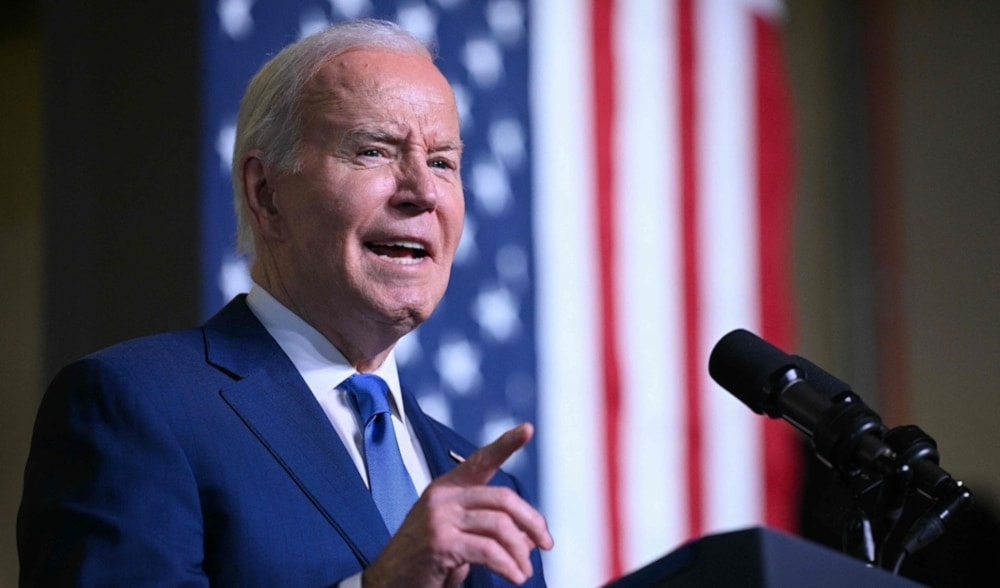Biden: 'Israel'-Lebanon ceasefire easier to achieve than Gaza deal
US President Joe Biden alleges that negotiating a ceasefire between "Israel" and Lebanon might be more feasible than reaching an agreement in Gaza.
-

US President Joe Biden speaks at a program in Sturtevant, Wisconsin, on May 8, 2024. (AFP)
UK Prime Minister Keir Starmer claimed that allies are collaborating to de-escalate tensions in the Middle East, emphasizing that there is no "military-only solution" as confrontations between Hezbollah and "Israel" continue.
US President Joe Biden alleged that negotiating a ceasefire between "Israel" and Lebanon might be more feasible than reaching an agreement in Gaza.
During a meeting in Berlin on Friday with Starmer, French President Emmanuel Macron, and German Chancellor Olaf Scholz, Biden reportedly discussed strategies to resolve the ongoing war in the Middle East, particularly following the killing of Hamas leader Yahya Sinwar in Gaza.
"There's an opportunity in my view, and my colleagues agree, that we can probably deal with Israel and Iran in a way that ends the conflict for a while," Biden stated.
"In other words, that stops the back and forth. We think that there is a possibility of working for a ceasefire in Lebanon. And it's going to be harder in Gaza. But we agree that there has to be an outcome," he added.
Biden refrained from confirming whether Israeli Prime Minister Benjamin Netanyahu assured him during their phone call on Thursday, following the confirmation of Hamas leader Yahya Sinwar's martyrdom, that "Israel" is prepared to return to negotiations regarding ceasefire agreements.
"We're in the middle of discussions about that," Biden stated.
Meanwhile, British Prime Minister Keir Starmer emphasized that allies are collaborating to de-escalate tensions in the region and acknowledged that there is no "military-only solution."
"The answer is diplomacy. And now we must make the most of this moment. What is needed now is a ceasefire in Gaza, the immediate and unconditional release of all hostages, immediate access to humanitarian aid, and a return to the path towards the two-state solution as the only way to deliver long-term peace and security," he claimed.
Biden's attempt to separate Gaza's ceasefire agreement from Lebanon's comes despite repeated Axis of Resistance statements that the operations in support of Gaza won't stop until the aggression on the Strip halts.
Meanwhile, the situation in Gaza remains dire as the Israeli genocide continues. Concurrently, Israeli aggression in Lebanon has escalated, further destabilizing the region. This ongoing Israeli carnage is fully supported by the United States, which sends billions of dollars worth of weapons. As the civilian death toll rises, calls for an immediate ceasefire and diplomatic intervention grow louder, highlighting the urgent need for a resolution.
Sending THAAD to 'Israel', Biden deepens involvement in war: WaPo
The United States is deploying one of its most advanced missile defense systems, along with approximately 100 troops, to "Israel", signaling deeper US involvement in the escalating Middle East tensions amid expectations of an imminent Israeli attack against Iran, The Washington Post reported earlier this week.
Later, the Pentagon announced that an advanced team of US military personnel, along with the initial components required to operate the THAAD anti-ballistic missile defense system, arrived in "Israel".
In a statement, the Pentagon said, "Yesterday, October 14, an advance team of US military personnel and initial components necessary to operate the Terminal High-Altitude Area Defense (THAAD) battery arrived in Israel."
This marks the first significant deployment of US troops to "Israel" since the start of the war on Gaza, occurring just weeks before the US presidential election, in which the country’s involvement in the war has become a contentious issue on the campaign trail, the newspaper pointed out.
It mentioned that US officials have been advising "Israel" against targeting Iran's nuclear, oil, and gas facilities, warning that such actions could trigger a broader escalation with far-reaching consequences for the global economy.
The deployment of the Terminal High Altitude Area Defense (THAAD) missile system is a strong indication that the US anticipates the Israeli attack to be “so comprehensive that the Iranians will have to respond," according to Aaron David Miller, a Middle East expert who has served as an advisor to multiple US administrations.
The latest move would add to the more than 50,000 tons of military equipment the US has supplied to "Israel" since the start of the war in October last year, as per the Israeli occupation's Security Ministry.
Israeli Security Minister Yoav Gallant vowed Wednesday a "powerful, precise, and above all — surprising" attack on Iran for its retaliatory ballistic missile strike against Israeli targets on October 1, which became known as Operation True Promise II.
However, Iranian officials have warned after the operation that any further Israeli action would be met with a harsh, proportional, and calculated response from Tehran.
The Washington Post indicated that the Iranian operation highlighted vulnerabilities in "Israel's" supposedly advanced missile defense system, as numerous missiles managed to breach it and hit occupied territory.
It also pointed out that on Sunday, a Hezbollah drone also evaded Israeli air defenses and struck an Israeli military base near Binyamina, south of the city of Haifa, killing four soldiers and injuring others.
The newspaper said that despite ongoing differences between US President Joe Biden and Israeli Prime Minister Benjamin Netanyahu over the course of the year-long war, the decision to provide the THAAD system before "Israel’s" anticipated strike on Iran underscores his continued trust in Netanyahu’s judgment.

 5 Min Read
5 Min Read










